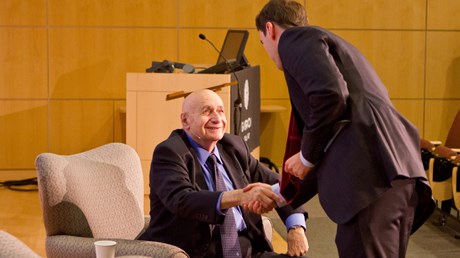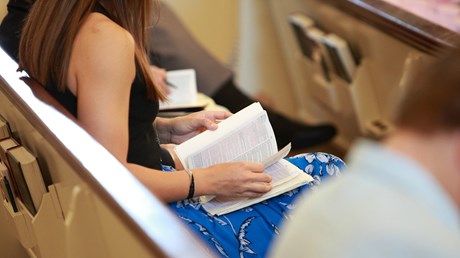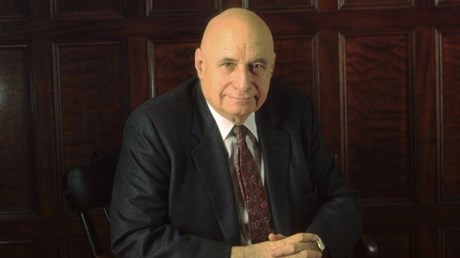Friday, 30 June 2017
Romans 12:3
from
https://www.biblegateway.com/passage/?version=NIV&search=Romans%2012:3
Why Christian Scholars Loved Peter Berger
His sympathetic treatment of faith made him a rock star among Christ-following academics.

In 1966, a Viennese-born sociologist, not quite 40 years old, produced a scholarly work that changed the world. Or more precisely, it changed the way we see and shape the world. The Social Construction of Reality, named one of the top five sociology publications of the 20th century by the International Sociological Association, became required reading for graduate students around the world soon after its publication. Moreover, Peter Berger (who coauthored the book with Thomas Luckmann) became one of the most recognized social scientists of the last century. On June 27, Berger passed away at his home in suburban Boston, concluding a lifetime of scholarly influence and a career that made him one of the most notable scholars of his generation.
It was Berger’s fascination with religion that made him and his work so significant to evangelical Christians. He called himself an “incurable Lutheran,” and his liberal Protestant theology might have placed him at odds with many evangelical leaders 100 years ago. But in our increasingly pluralistic world, Berger’s sympathetic treatment of spirituality and faith made him something of a rock star among Christ-following academics.
In the 1960s and 1970s, Berger’s work underscored the importance of social structures—and how they come to be through human actions (what social scientists refer to as individual “agency”). Culture, he argued, is most powerful when it is taken for granted. In The Sacred Canopy (1967) Berger explained how religion helped people make sense of the world by providing a “sheltering” tent under which all of life could make sense. But over time (in Europe, tracing an historical arc from the 1755 Lisbon earthquake ...
from
http://feeds.christianitytoday.com/~r/christianitytoday/ctmag/~3/INFp44gsw50/why-christian-scholars-loved-peter-berger.html
The absurdity of the “Culture Wars”
from
http://www.patheos.com/blogs/tippling/2017/06/30/absurdity-culture-wars/
Are Catholic Clergy more Likely to Be Paedophiles than the General Public?
from
http://www.patheos.com/blogs/tippling/2017/06/30/catholic-clergy-likely-paedophiles-general-public/
Buffet Discipleship: Picking and Choosing in Unbiblical Proportions
The root of being a disciple is discipline.

The allure of a well-stocked buffet is that you can load up on the foods you love and avoid those you dislike. For most of us, this means plates over-laden with entrees and desserts and void of foods we find unpleasant. We don’t include foods we don’t like, such as (for many of us) brussel sprouts, or even foods we think are boring, such as cottage cheese or gelatin. When faced with so many gastronomic options, we lack the discipline to fill our plates with well-balanced choices or to avoid sugary treats that really aren’t good for us. What we eat is based on our personal preferences, not based on the guidelines set forth by the USDA.
Arguably, many of us treat our spiritual lives like a buffet. Instead of following the entire menu of spiritual disciplines, we pick and choose what biblical guidelines we will or will not follow. While we know God prescribes a balanced diet of numerous disciplines, we tend to pick and choose in our spiritual lives just as we pick and choose in a buffet. Correspondingly, just as continually ignoring certain types of food at the buffet will result in us being physically malnourished, so continually ignoring mandates from God will result in us being spiritually malnourished.
Here are some reasons we suffer from spiritual malnourishment.
1. We don’t understand what we need to be healthy.
Since their inception, the USDA dietary guidelines have been presented in wheels, squares, pyramids, and plates. The recent iteration, My Plate, was launched in 2011, when the USDA abandoned the rainbow-banded pyramid that festooned our cereal boxes. After almost 20 years of redesign, they discontinued the graphic because people just didn’t understand what the pyramid meant in relation ...
from
http://feeds.christianitytoday.com/~r/christianitytoday/ctmag/~3/78qWRrDB290/buffet-discipleship-picking-and-choosing-in-unbiblical-prop.html
Cardinal Pell Charged with Historic Sex Abuse
from
http://www.patheos.com/blogs/tippling/2017/06/30/cardinal-pell-charged-historic-sex-abuse/
Thursday, 29 June 2017
What the Single in Your Pew Needs from You
Singles are on the rise. Here’s what forward-looking churches need to know.

According to recent Pew data, the number of married Americans is at its lowest point since at least 1920. In 2015, only half of Americans ages 18 and over were married, compared with 72 percent in 1960. Put another way: Singles are on the rise and beginning to outnumber marrieds. The church, however, doesn’t reflect those numbers. According to a recent Barna study, while more than half of Americans (54%) between the ages of 18 and 49 are single, only 23 percent of active churchgoers are single. “Your church should be filling up at least half of your pews with single people,” writes Joyce Chiu for Barna Trends. “So what will get them there?”
In my recent book, One by One: Welcoming the Singles in Your Church, I share my own experiences as well as those of many other single Christians with whom I’ve talked over the past several years. What emerges is a portrait of an evangelical church that is still firmly family-centered even while the demographics within it have shifted. Single people make up more and more of the church body, which means forward-looking local churches benefit from understanding us and incorporating us meaningfully into community life. Although single and married believers are in the same boat together—we’re all at church to worship and serve God—nonetheless singles have unique needs. We want to be visible; we want to belong. We also have unique contributions to make in advancing Christ’s kingdom.
So how can your local church create a welcoming space for singles?
Recognize that single people’s needs may look different from yours.
When a single person talks about feeling lonely, it’s common for a married person to counter that he or she often ...
from
http://feeds.christianitytoday.com/~r/christianitytoday/ctmag/~3/ovATpruWegw/what-single-in-your-pew-needs-from-you.html
Zechariah 14:9
from
https://www.biblegateway.com/passage/?version=NIV&search=Zechariah%2014:9
Died: Peter Berger, Prominent Sociologist of Religion
Thornbury: His work ‘made all the theologians just want to be sociologists when they grew up.’

Peter Berger, an “incurable Lutheran” who became one of America’s most respected sociologists of religion, has died.
Boston University (BU) announced the passing this week of the 88-year-old professor emeritus, who founded the school’s Institute on Culture, Religion, and World Affairs in 1985 and led it to become a leading source of scholarship on “religion in an age of globalization.”
Southern Seminary president Al Mohler praised Berger as “perhaps the most influential social thinker of our times” and “one of the individuals I cite most frequently.”
Berger’s writing was “so good that it made all the theologians just want to be sociologists when they grew up,” stated Gregory Thornbury, president of The King’s College, in a tweet that also praised scholar Rodney Stark.
“There have been few scholars as independently-minded and as influential,” tweeted Hunter Baker, author of The End of Secularism and a professor of political science at Union University.
Berger was revered among evangelical scholars, though not an evangelical himself.
“This is not my community. I’m evangelisch but not evangelical,” he told Gordon College’s Center for Faith and Inquiry (CFI) in a 2013 interview. “I usually describe myself as incurably Lutheran, but I’m very comfortable with evangelicals. And between evangelicals and mainline Protestants, I prefer evangelicals for reasons theologically.”
Theologian Os Guinness told CT in 2015 that Berger had “probably shaped my mind more than any other living person,” citing the sociologist’s “wonderful idea of ‘signals of transcendence.’” ...
from
http://feeds.christianitytoday.com/~r/christianitytoday/ctmag/~3/8LLaZmmOFRQ/died-peter-berger-sociologist-religion-secularization-theor.html
China, House Churches, and the Growth of the Kingdom
Two-thirds of Chinese Christians attend a house church.

My host touched the ‘down’ button in the elevator of a high-rise apartment. Its door opened and we stepped out into underground parking. We maneuvered around cars and crates in the musty and dark basement. Then, to my surprise, I saw through a door a red cross with children’s toys scattered about. The pastor welcomed us into his ‘house church,’ a small room seating 70 adorned by a small pulpit.
Later that day across the city—in China, there are more than 40 cities with populations over five million—we visited another ‘house church.’ On the side of a commercial building was a cross, publicly announcing the church’s presence. Arriving on the sixth floor, we entered an amazing 7,000 square foot complex fitted with multiple offices and a 600-seat auditorium.
Saturday night in another city, my translator punched in floor five. We were greeted and shown a spacious sanctuary seating 350, its platform lit with colored floodlights as the worship band prepared.
Just down a hall, I poked my head into its seminary facility.
Sunday, again in a high-rise commercial building, I spoke to two congregations, who met in a 120-seating worship center, surrounded by Sunday School rooms.
Monday, I rode a high-speed train to yet another city where a young couple took me to a commercial high rise. Meeting with a dozen of their senior staff, they told me that in 2016 the government shut down their former rental space in preparation for the meeting of the G20. The police rationale was they wanted all unregistered (aka ‘house churches’) churches closed so as to prevent protest. A year later, this same church was up and running in a new rental space with multiple staff and a worship ...
from
http://feeds.christianitytoday.com/~r/christianitytoday/ctmag/~3/xvMYeH5qfSE/china-house-churches-and-growth-of-kingdom.html
Finally, Jackie Robinson’s Faith Is Getting the Attention It Deserves
Two books shine a long-overdue spotlight on the Christian convictions of the man who broke baseball’s color barrier.

There is a God-shaped hole in the heart of 42, the 2013 film that depicts the inspiring story of Jackie Robinson. Observers noticed it at the time, pointing out that the film mostly ignored the role that faith played in Robinson’s life and in Branch Rickey’s decision to sign him to the Brooklyn Dodgers in 1947. And the film is not the only account of Robinson’s life that downplays religion. While Rickey’s stalwart Methodist convictions have been widely recognized, most biographies of Robinson provide limited attention to his own faith.
Not so in Michael G. Long’s and Chris Lamb’s Jackie Robinson: A Spiritual Biography(Westminster John Knox Press) and Ed Henry’s 42 Faith: The Rest of the Jackie Robinson Story(Thomas Nelson). Published earlier this year, both books claim to offer a thorough look at the religious dimensions of Robinson’s life.
Reporter’s Instincts
Ed Henry worked at CNN for eight years before joining Fox News Channel in 2011 as chief national correspondent. His desire to write a book about Jackie Robinson’s faith grew out of his reporter’s instincts. In 2007 freelance journalist Donna Shor told him that her father-in-law, Rev. L. Wendell Fifield, was involved with Branch Rickey’s decision to sign Robinson. In 1945, she claimed, Rickey visited Fifield’s Plymouth Church of the Pilgrims in Brooklyn, where he prayed for assurance from God that signing Robinson was the right move to make. Hearing Shor’s story, Henry writes, “sent me on this journey to find out how much of a role faith played” in bringing Robinson and Rickey together and in empowering Robinson to succeed.
Four years later, Henry heard from Shor again. This ...
from
http://feeds.christianitytoday.com/~r/christianitytoday/ctmag/~3/ifhWlGm_M04/jackie-robinsons-faith-attention-deserves.html
Finally, Jackie Robinson’s Faith Is Getting the Attention It Deserves
Two books shine a long-overdue spotlight on the Christian convictions of the man who broke baseball’s color barrier.

There is a God-shaped hole in the heart of 42, the 2013 film that depicts the inspiring story of Jackie Robinson. Observers noticed it at the time, pointing out that the film mostly ignored the role that faith played in Robinson’s life and in Branch Rickey’s decision to sign him to the Brooklyn Dodgers in 1947. And the film is not the only account of Robinson’s life that downplays religion. While Rickey’s stalwart Methodist convictions have been widely recognized, most biographies of Robinson provide limited attention to his own faith.
Not so in Michael G. Long’s and Chris Lamb’s Jackie Robinson: A Spiritual Biography(Westminster John Knox Press) and Ed Henry’s 42 Faith: The Rest of the Jackie Robinson Story(Thomas Nelson). Published earlier this year, both books claim to offer a thorough look at the religious dimensions of Robinson’s life.
Reporter’s Instincts
Ed Henry worked at CNN for eight years before joining Fox News Channel in 2011 as chief national correspondent. His desire to write a book about Jackie Robinson’s faith grew out of his reporter’s instincts. In 2007 freelance journalist Donna Shor told him that her father-in-law, Rev. L. Wendell Fifield, was involved with Branch Rickey’s decision to sign Robinson. In 1945, she claimed, Rickey visited Fifield’s Plymouth Church of the Pilgrims in Brooklyn, where he prayed for assurance from God that signing Robinson was the right move to make. Hearing Shor’s story, Henry writes, “sent me on this journey to find out how much of a role faith played” in bringing Robinson and Rickey together and in empowering Robinson to succeed.
Four years later, Henry heard from Shor again. This ...
from
http://feeds.christianitytoday.com/~r/christianitytoday/ctmag/~3/NNl7NnvtvUs/finally-jackie-robinsons-faith-is-getting-attention-it-dese.html